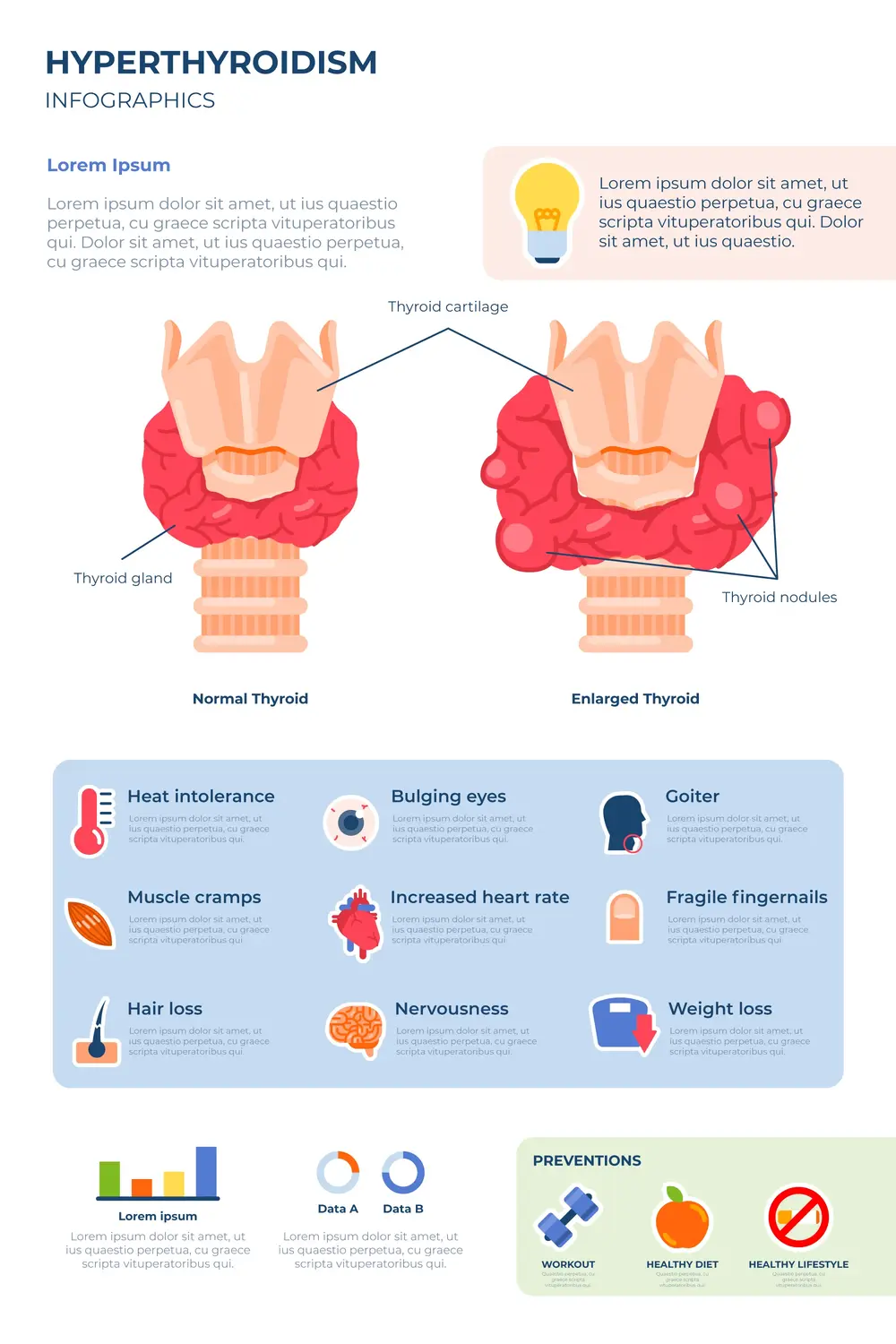Thyroid Gland and Pregnancy: Navigating the Complexities
The thyroid gland, a small but crucial organ located in the neck, plays a significant role in regulating metabolism, energy production, and overall hormonal balance. During pregnancy, the thyroid gland’s function becomes even more critical as it affects both maternal health and fetal development. Understanding the relationship between the thyroid gland and pregnancy is essential for ensuring a healthy outcome for both mother and baby. In this blog, we will explore the importance of thyroid health during pregnancy, common thyroid disorders, their diagnosis, and management.
The Role of the Thyroid Gland in Pregnancy
The thyroid gland produces hormones, primarily thyroxine (T4) and triiodothyronine (T3), which are vital for numerous bodily functions, including metabolism, heart rate, and temperature regulation. During pregnancy, the demand for thyroid hormones increases significantly to support the developing fetus, especially during the first trimester when the baby’s thyroid gland is not yet fully functional. Adequate thyroid hormone levels are crucial for:
- Fetal Brain Development: Thyroid hormones are essential for the proper development of the fetal brain and nervous system.
- Metabolic Regulation: Increased metabolism to meet the energy demands of pregnancy.
- Placental Function: Proper thyroid function supports the development and function of the placenta.
Common Thyroid Disorders in Pregnancy
Hypothyroidism
Hypothyroidism, a condition where the thyroid gland produces insufficient amounts of thyroid hormones, can have significant implications for both the mother and the developing fetus during pregnancy.
Causes of Hypothyroidism in Pregnancy
- Autoimmune Thyroiditis (Hashimoto’s Disease): The most common cause of hypothyroidism, where the immune system attacks the thyroid gland, leading to decreased hormone production.
- Iodine Deficiency: Although rare in developed countries, iodine deficiency can lead to hypothyroidism.
- Previous Thyroid Surgery or Radiation Therapy: Surgical removal of the thyroid gland or radiation treatment for thyroid conditions can result in hypothyroidism.
- Medications: Certain medications, such as lithium, can interfere with thyroid function.
Symptoms of Hypothyroidism in Pregnancy
Hypothyroidism can present with a variety of symptoms, some of which may overlap with normal pregnancy symptoms, making diagnosis challenging.
- Fatigue: Excessive tiredness and low energy levels.
- Weight Gain: Unexplained weight gain or difficulty losing weight despite a healthy diet and exercise.
- Cold Intolerance: Sensitivity to cold temperatures.
- Constipation: Difficulty with bowel movements.
- Dry Skin and Hair: Skin may become dry and flaky, and hair may become brittle.
- Muscle Weakness: Generalized muscle weakness and aches.
- Depression: Feelings of sadness, depression, or mood swings.
Hyperthyroidism
Hyperthyroidism is characterized by an overactive thyroid gland that produces excessive thyroid hormones. It also poses significant risks during pregnancy.
Causes of Hyperthyroidism in Pregnancy
- Graves’ Disease
- The most common cause of hyperthyroidism in pregnant women. It is an autoimmune disorder where the immune system attacks the thyroid gland, causing it to produce too much thyroid hormone.
- Gestational Transient Thyrotoxicosis
- A temporary form of hyperthyroidism that can occur in early pregnancy, often due to high levels of human chorionic gonadotropin (hCG).
- Toxic Multinodular Goiter and Toxic Adenoma
- Less common causes where thyroid nodules produce excessive thyroid hormones.
Symptoms:
Weight loss, rapid heartbeat, heat intolerance, nervousness, and tremors.

Risks and Complications
For the Mother:
- Preeclampsia: High blood pressure and damage to other organs.
- Heart Problems: Increased risk of arrhythmias and heart failure.
- Thyroid Storm: A life-threatening condition with severe symptoms of hyperthyroidism.
For the Baby:
- Preterm Birth: Increased risk of being born before the due date.
- Low Birth Weight: Reduced weight at birth.
- Fetal Growth Restriction: Limited growth and development in the womb.
- Miscarriage and Stillbirth: Higher risk of pregnancy loss.
- Neonatal Thyrotoxicosis: Overactive thyroid in the newborn.
Postpartum thyroiditis
Postpartum thyroiditis is an autoimmune thyroid disorder that affects about 5-10% of women within the first year after giving birth. It is characterized by inflammation of the thyroid gland, which can cause temporary thyroid dysfunction. The condition usually resolves on its own, but it requires monitoring and management to ensure maternal well-being.
Symptoms of Postpartum Thyroiditis
The symptoms of postpartum thyroiditis can vary depending on whether the woman is in the hyperthyroid or hypothyroid phase:
Hyperthyroid Phase (First 1-4 months postpartum):
- Nervousness
- Irritability
- Anxiety
- Insomnia
- Weight loss
- Palpitations
- Heat intolerance
Hypothyroid Phase (4-8 months postpartum):
- Fatigue
- Weight gain
- Cold intolerance
- Constipation
- Dry skin and hair
- Depression
- Sluggishness
It’s important to note that not all women experience both phases; some may only have hyperthyroidism or hypothyroidism.
Diagnosis of Thyroid Disorders in Pregnancy
Diagnosing thyroid disorders during pregnancy is crucial for ensuring the health of both the mother and the developing fetus. Thyroid dysfunction can significantly impact pregnancy outcomes, so early and accurate diagnosis is essential. The process involves a combination of medical history, physical examination, and a series of laboratory tests. Here’s a detailed overview of the diagnostic approach for thyroid disorders in pregnancy:
1. Medical History and Physical Examination
Medical History
- Symptoms: The healthcare provider will inquire about symptoms such as fatigue, weight changes, heat or cold intolerance, palpitations, and changes in mood or bowel habits.
- Previous Thyroid Issues: A history of thyroid disorders, such as hypothyroidism or hyperthyroidism, and any previous treatment.
- Family History: Information about any family history of thyroid disease or autoimmune conditions.
Physical Examination
- Thyroid Gland: Examination of the neck for an enlarged thyroid (goiter) or nodules.
- Heart Rate: Checking for tachycardia (rapid heartbeat) or bradycardia (slow heartbeat).
- Reflexes: Testing for brisk reflexes, which may indicate hyperthyroidism, or slow reflexes, which may suggest hypothyroidism.
- Skin and Hair: Assessing for dry skin and hair (hypothyroidism) or warm, moist skin and thinning hair (hyperthyroidism).
2. Laboratory Tests
Thyroid Function Tests
- Thyroid-Stimulating Hormone (TSH): The most sensitive test for thyroid function.
- Low TSH: Indicates hyperthyroidism.
- High TSH: Indicates hypothyroidism.
- Free Thyroxine (Free T4) and Free Triiodothyronine (Free T3): Measure the active forms of thyroid hormones.
- High Free T4/T3: Indicates hyperthyroidism.
- Low Free T4/T3: Indicates hypothyroidism.
Thyroid Antibodies
- Thyroid Peroxidase Antibodies (TPOAb): High levels of these antibodies are a sign that Hashimoto’s disease is causing hypothyroidism.
- Thyroglobulin Antibodies (TgAb): High levels of these antibodies are a sign of Hashimoto’s disease.
- Thyroid-Stimulating Immunoglobulin (TSI): Elevated in Graves’ disease, an autoimmune cause of hyperthyroidism.
Other Blood Tests
- Complete Blood Count (CBC): To check for anemia, which can occur with hypothyroidism.
- Liver Function Tests: To ensure liver health, as some thyroid medications can affect liver function.
- Electrolytes: Checking levels of calcium and potassium, which can be affected by thyroid dysfunction.
3. Imaging Studies
Thyroid Ultrasound
- Purpose: Non-invasive imaging to evaluate the size, shape, and structure of the thyroid gland.
- Use: Detects nodules, goiter, and other abnormalities.
Radioactive Iodine Uptake Test and Thyroid Scan
- Not Recommended During Pregnancy: These tests involve radiation exposure, which is harmful to the fetus. They are typically reserved for postpartum evaluation if needed.
4. Special Considerations During Pregnancy
Gestational Age Adjustments
- First Trimester: TSH levels may be naturally lower due to the influence of human chorionic gonadotropin (hCG), which can stimulate the thyroid. Normal reference ranges for TSH are adjusted accordingly.
- Second and Third Trimesters: TSH levels gradually normalize, and standard reference ranges apply.
Monitoring and Follow-Up
- Frequent Testing: Regular monitoring of thyroid function tests is essential to adjust treatment and ensure stable thyroid hormone levels.
- Postpartum Evaluation: Continued monitoring postpartum to detect and manage conditions like postpartum thyroiditis.
Management of Thyroid Diseases in Pregnancy
Managing thyroid disorders during pregnancy requires careful monitoring and treatment to ensure both maternal and fetal health. Here’s a comprehensive guide on the management of thyroid disorders, including hypothyroidism and hyperthyroidism, during pregnancy:
Management of Hypothyroidism in Pregnancy
Hypothyroidism, characterized by low thyroid hormone levels, can impact pregnancy outcomes if not properly managed. The goal of treatment is to maintain thyroid hormone levels within the normal range to support maternal and fetal health.
Treatment Options
- Levothyroxine Therapy
- Purpose: Levothyroxine is a synthetic thyroid hormone that replaces the deficient thyroid hormone in the body.
- Dosage: Initial dosage is based on pre-pregnancy thyroid function tests, adjusted frequently during pregnancy based on TSH levels.
- Monitoring: Regular monitoring of TSH levels every 4-6 weeks during the first half of pregnancy and periodically thereafter.
- Monitoring and Adjustments
- Thyroid Function Tests: Frequent testing of TSH levels to ensure adequate thyroid hormone replacement.
- Maternal-Fetal Monitoring: Regular prenatal visits to monitor fetal growth and development, especially if thyroid levels are not well-controlled.
- Educational Support
- Patient Education: Educating the patient about the importance of adherence to medication and regular follow-up visits.
- Dietary Advice: Encouraging a balanced diet with adequate iodine intake, which is essential for thyroid hormone production.
Management of Hyperthyroidism in Pregnancy
Hyperthyroidism, characterized by excessive thyroid hormone production, requires management to prevent complications such as preterm birth, preeclampsia, and fetal growth restriction.
Treatment Options
- Antithyroid Medications
- Propylthiouracil (PTU): Generally preferred during the first trimester due to lower risk of birth defects.
- Methimazole (MMI): Used after the first trimester if PTU is not tolerated or effective.
- Dosage: Adjusted to maintain thyroid hormone levels within the normal range.
- Monitoring: Regular monitoring of thyroid function tests, liver function, and fetal growth.
- Beta-Blockers
- Purpose: Used for symptomatic relief of rapid heart rate, tremors, and anxiety.
- Caution: Limited use due to potential effects on fetal growth and development, usually reserved for short-term symptomatic relief.
- Management Planning
- Multidisciplinary Approach: Collaboration between endocrinologists, obstetricians, and pediatricians for comprehensive management.
- Fetal Monitoring: Regular ultrasound examinations to monitor fetal growth and development, especially if the mother’s thyroid levels are not well-controlled.
Special Considerations
- Iodine Supplementation
- Caution: Routine iodine supplementation is generally not recommended in areas with sufficient iodine intake, as excessive iodine can exacerbate thyroid dysfunction.
- Surgical Management
- Thyroidectomy: Considered in rare cases when antithyroid medications are ineffective or contraindicated, typically performed in the second trimester to minimize risks to the fetus.
- Postpartum Management
- Continued Monitoring: Thyroid function tests postpartum to assess thyroid status and adjust medication as needed.
- Breastfeeding: Antithyroid medications (PTU or MMI) can be used during breastfeeding, but the dosage should be adjusted to prevent excessive exposure to the infant.
- Healthy Diet: Ensuring a balanced diet rich in nutrients, especially iodine, which is essential for thyroid function.
- Stress Management: Techniques such as yoga, meditation, and relaxation exercises to reduce stress levels, which can impact thyroid function.
Conclusion
Diagnosing thyroid disorders during pregnancy is a critical step in ensuring maternal and fetal health. It involves a thorough evaluation of symptoms, a detailed medical history, physical examination, and specific laboratory tests. Early detection and appropriate management of thyroid dysfunction can significantly improve pregnancy outcomes and reduce the risk of complications. Pregnant women should be vigilant about their thyroid health, seek regular prenatal care, and discuss any concerns with their healthcare provider to ensure timely and effective diagnosis and treatment.




